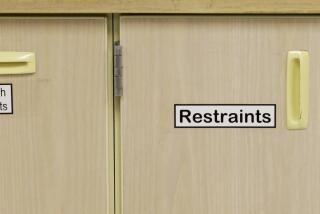In Court, Mental Health ‘Experts’ Most Probably Aren’t
- Share via
Do mental health professionals--psychiatrists and clinical psychologists--aid courtroom justice or constitute a burden on the legal system? It has been estimated that psychiatrists and clinical psychologists participate in as many as 1 million cases a year. Their opinions as “experts” may play a role in determining whether a person is confined to a mental institution, obtains custody of a child, receives monetary damages for injuries, or is held not accountable for acts that otherwise would be considered crimes. Much of the related cost is borne by the taxpayers.
Mental health professionals may provide helpful treatment for people with psychological problems. However, other than impressive-sounding credentials and a facade of scientific knowledge, there is little reason to believe these professionals possess the capabilities that the law normally requires to qualify for rendering expert opinions. The state of knowledge of scientific disciplines or professions is contained in their literature--books and journals. Overall, scientific literature fails to support a view of psychiatrists and psychologists as experts in assessing mental condition. They do not even have an adequate system for classifying disorders, although this is an essential prerequisite for developing a valid body of knowledge about such disorders. There is a substantial body of literature in psychiatry and clinical psychology that, at the minimum, creates serious doubts about whether psychiatrists and psychologists possess the kind of validated knowledge and methodology of assessment that would allow them to render opinions without, in effect, committing perjury.
The law of evidence requires that expert opinions be admitted only if they can be stated with “reasonable certainty” or, in the case of mental health issues, with reasonable psychiatric or psychological certainty. But there is no validated body of knowledge or principles that provides a high probability of correctly determining whether, for example, an individual at some time in the past was able to distinguish right from wrong or whether someone is presently dangerous. The research shows the opinions are about twice as likely to be wrong than right in determining dangerousness of a person. How, then, can the trial process be aided by such opinions? How, then, can an honest and informed psychiatrist or psychologist say under oath that such an opinion can be stated with reasonable certainty? An honest professional who is acquainted with the literature would have to acknowledge that his opinion is speculative, in which case the court would not allow it in evidence.
It would seem that given this deficiency of knowledge, some action should be considered, either by the Legislature or the courts, to eliminate or reduce the trial testimony of psychiatrists and clinical psychologists. One approach is to establish rigorous requirements for expert opinion. There are some precedents for this action. In 1981 the California Legislature eliminated the defense of diminished capacity in criminal cases and severely curtailed the testimony of mental health professionals in criminal proceedings. Recently, the Georgia Supreme Court enunciated a new standard for the admission of scientific evidence, requiring that it “has reached a scientific stage of verifiable certainty.” Such a standard, if rigorously applied, could do much to relieve the courts and the public of the burdens created by psychiatric and psychological testimony.
The arguments most often offered by psychiatrists and psychologists in defense of their participation is that they are the best qualified to offer evidence in these issues. (There is some research indicating their opinions are not more accurate than those of lay persons.) Even when acknowledging the deficiencies of the knowledge base, they counter with the question: Who will provide evidence on these issues if they do not? This is an assertion of expertise by default. They cannot acquire expertise by virtue of the fact that no one else has it.
For example, determining whether someone is telling the truth is an issue of equal importance in lawsuits and is more frequently an issue than psychological condition. Therefore, polygraph operators can make the same argument as psychiatrists: That is, polygraphers have education and training in detecting falsehood and a methodology they employ for that purpose. The evidence for the validity of their conclusions is at least as good as that in the mental health professions. Yet the law almost uniformly refuses to admit polygraph evidence. This is not an argument for admission of polygraph evidence but is presented only to show that a need for expert evidence does not mean that such expertise exists. Nor does such need mean that evidence should be used no matter how fraught with problems or no matter how poor the quality.
Expertise can only be established by demonstration, not by declaration.


